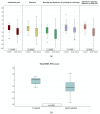Irregular Dietary Habits with a High Intake of Cereals and Sweets Are Associated with More Severe Gastrointestinal Symptoms in IBS Patients
- PMID: 31195706
- PMCID: PMC6627681
- DOI: 10.3390/nu11061279
Irregular Dietary Habits with a High Intake of Cereals and Sweets Are Associated with More Severe Gastrointestinal Symptoms in IBS Patients
Abstract
Dietary advice constitutes one of the first choices of treatment for irritable bowel syndrome (IBS). We have recognized an increased prevalence of sucrase-isomaltase (SI) gene variants in IBS patients, possibly rendering starch- and sucrose-intolerance. The aims were to examine participants' dietary habits at baseline, to correlate habits with gastrointestinal (GI) symptoms and blood levels of minerals and vitamins, and to examine the effect of a starch- and sucrose-reduced diet (SSRD) on GI symptoms. In the study 105 IBS patients (82 women, 46.06 ± 13.11 years), irritable bowel syndrome-symptom severity scale (IBS-SSS)>175, were randomized to SSRD for 2 weeks or continued ordinary eating habits. Blood samples, visual analog scale for irritable bowel syndrome (VAS-IBS), IBS-SSS, and 4-day food diaries were collected at baseline and after 2 weeks. Patients with irregular dietary habits exhibited higher IBS-SSS than patients with regular habits (p = 0.029). Women already on a diet had lower ferritin levels than others (p = 0.029). The intervention led to 66.3% of patients being responders, with differences in the change of IBS-SSS (p < 0.001), abdominal pain (p = 0.001), diarrhea (p = 0.002), bloating and flatulence (p = 0.005), psychological well-being (p = 0.048), and intestinal symptoms' influence on daily life (p < 0.001), compared to controls. Decreased intake of cereals and sweets/soft drinks correlated with decreased scores.
Keywords: diet; dietary habits; irritable bowel syndrome; malnutrition; starch; sucrose.
Conflict of interest statement
The authors have no conflicts of interest.
Figures

Similar articles
-
A Dietary Intervention with Reduction of Starch and Sucrose Leads to Reduced Gastrointestinal and Extra-Intestinal Symptoms in IBS Patients.Nutrients. 2019 Jul 20;11(7):1662. doi: 10.3390/nu11071662. Nutrients. 2019. PMID: 31330810 Free PMC article. Clinical Trial.
-
Theories behind the effect of starch‑ and sucrose‑reduced diets on gastrointestinal symptoms in irritable bowel syndrome (Review).Mol Med Rep. 2021 Oct;24(4):732. doi: 10.3892/mmr.2021.12372. Epub 2021 Aug 20. Mol Med Rep. 2021. PMID: 34414452 Free PMC article. Review.
-
Assessment of a 4-Week Starch- and Sucrose-Reduced Diet and Its Effects on Gastrointestinal Symptoms and Inflammatory Parameters among Patients with Irritable Bowel Syndrome.Nutrients. 2021 Jan 28;13(2):416. doi: 10.3390/nu13020416. Nutrients. 2021. PMID: 33525489 Free PMC article. Clinical Trial.
-
Poor intake of vitamins and minerals is associated with symptoms among patients with irritable bowel syndrome.J Gastroenterol Hepatol. 2022 Jul;37(7):1253-1262. doi: 10.1111/jgh.15830. Epub 2022 Apr 5. J Gastroenterol Hepatol. 2022. PMID: 35304769 Free PMC article.
-
Diet in irritable bowel syndrome.Nutr J. 2015 Apr 14;14:36. doi: 10.1186/s12937-015-0022-3. Nutr J. 2015. PMID: 25880820 Free PMC article. Review.
Cited by
-
A Dietary Intervention with Reduction of Starch and Sucrose Leads to Reduced Gastrointestinal and Extra-Intestinal Symptoms in IBS Patients.Nutrients. 2019 Jul 20;11(7):1662. doi: 10.3390/nu11071662. Nutrients. 2019. PMID: 31330810 Free PMC article. Clinical Trial.
-
Nutritional Management of Gastrointestinal Diseases and Disorders.Nutrients. 2019 Dec 10;11(12):3013. doi: 10.3390/nu11123013. Nutrients. 2019. PMID: 31835457 Free PMC article.
-
Theories behind the effect of starch‑ and sucrose‑reduced diets on gastrointestinal symptoms in irritable bowel syndrome (Review).Mol Med Rep. 2021 Oct;24(4):732. doi: 10.3892/mmr.2021.12372. Epub 2021 Aug 20. Mol Med Rep. 2021. PMID: 34414452 Free PMC article. Review.
-
Living with Gluten and Other Food Intolerances: Self-Reported Diagnoses and Management.Nutrients. 2020 Jun 26;12(6):1892. doi: 10.3390/nu12061892. Nutrients. 2020. PMID: 32604710 Free PMC article.
-
A Starch- and Sucrose-Reduced Diet in Irritable Bowel Syndrome Leads to Lower Circulating Levels of PAI-1 and Visfatin: A Randomized Controlled Study.Nutrients. 2022 Apr 19;14(9):1688. doi: 10.3390/nu14091688. Nutrients. 2022. PMID: 35565656 Free PMC article. Clinical Trial.
References
-
- National Institute for Health and Clinical Excellence . NICE Clinical Guideline61: Irritable Bowel Syndrome in Adults: Diagnosis and Management of Irritable Bowel Syndrome in Primary Care. NICE; London, UK: 2008. Last updated April 2017.
Publication types
MeSH terms
Substances
Grants and funding
LinkOut - more resources
Full Text Sources

